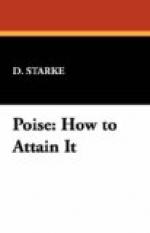It seems probable that this tendency to exaggerate everything with which they come in contact is due solely to egoism. It is certain at any rate that egoism plays a large part in it, but some portion of it is due to the lack of observation that characterizes all people of timidity.
The mental idleness and the instability of mind that we have already considered render such people less inclined to consider with any degree of care those things which do not touch them directly.
At this stage, it is no longer possible for them to feign ignorance in order to avoid the trouble of thinking, and they are only touched, even by the most personal matters, to the extent that circumstances impose upon them the necessity of thinking or of acting with reference to the subject under consideration.
The idea that they can no longer avoid the resolutions which must be made and their fear of the consequences which may result from these affect them to such a profound extent that the most insignificant of occurrences immediately assumes for them an altogether incommensurate importance.
This state of mind is a notable foe of poise. It is practically impossible for a person under such conditions to believe that any considerable effort he has made can have passed unperceived.
This propensity to assign an exaggerated importance to personal affairs develops egoism, the avowed enemy of poise. An egoist necessarily assumes that the rest of the world attributes to his acts the importance he himself assigns to them.
This preoccupation does not fail to upset him. It increases his embarrassment and the fear of not appearing in the light in which he wishes to be seen paralyzes him, while the dread of what other people may think prevents him from being himself.
To this cause many otherwise inexplicable defeats must be assigned, the result of which is a renewed resentment against the world at large and an ardent desire to avoid any further exposure to the chance of failure.
A case in point is the man who becomes nervous while making a speech, starts to stammer, and makes a lamentable failure of what began well enough, because he imagines that persons in the audience are making fun of him.
He has overheard a word, or surprized a look, neither of which had any relation to him, but so great is his egoism that he does not dream that any one in the audience can be so lacking in taste as to be concerned with anything but himself.
Had this man, in spite of his egoism, been endowed with poise, he would have gone along calmly, simply forcing himself to ignore all criticism and to impress his very critics by his attitude and his eloquence. But his distrust of himself, his mental instability, his habitual weakness of reasoning, all these enemies of poise league themselves together to inflict upon him a defeat, of which the memory will only aggravate his nervousness and his desire never to repeat such an unpleasant experience.




